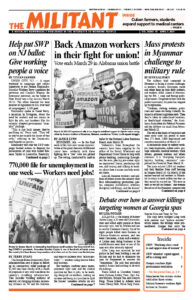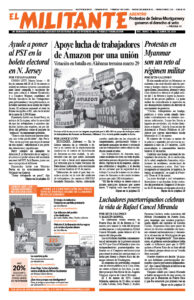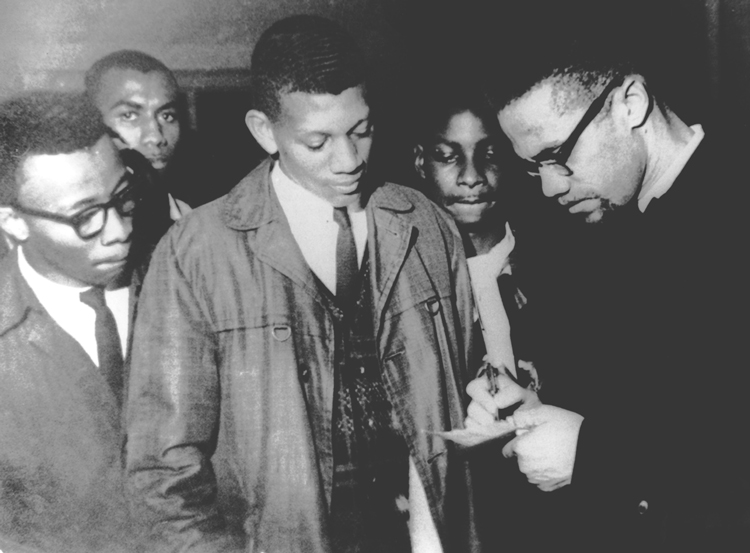The French edition of Malcolm X Talks to Young People is one of Pathfinder’s Books of the Month for March. In the last year of his life, Malcolm emerged as the authentic voice of the forces of the coming American revolution. The main excerpt is from his speech “See for Yourself, Listen for Yourself, Think for Yourself,” given Jan. 1, 1965, in Harlem to a group of high school youth from McComb, Mississippi, who had been engaged in civil rights battles there, including registering Blacks to vote in 1964. They had come to New York at the invitation of the Student Nonviolent Coordinating Committee, which had gone to McComb to help launch the right-to-vote effort. The second piece is the conclusion of “Any Means Necessary to Bring About Freedom,” a speech to students at Oxford University in England on Dec. 4, 1964. Copyright © 2011. Reprinted by permission of Pathfinder Press.
[O]ne of the first things I think young people, especially nowadays, should learn how to do is see for yourself and listen for yourself and think for yourself. Then you can come to an intelligent decision for yourself. But if you form the habit of going by what you hear others say about someone, or going by what others think about someone, instead of going and searching that thing out for yourself and seeing for yourself, you’ll be walking west when you think you’re going east, and you’ll be walking east when you think you’re going west. So this generation, especially of our people, have a burden upon themselves, more so than at any other time in history. The most important thing we can learn how to do today is think for ourselves.
It’s good to keep wide-open ears and listen to what everybody else has to say, but when you come to make a decision, you have to weigh all of what you’ve heard on its own, and place it where it belongs, and then come to a decision for yourself. You’ll never regret it. But if you form the habit of taking what someone else says about a thing without checking it out for yourself, you’ll find that other people will have you hating your own friends and loving your enemies. This is one of the things that our people are beginning to learn today — that it is very important to think out a situation for yourself. If you don’t do it, then you’ll always be maneuvered into actually — You’ll never fight your enemies, but you will find yourself fighting your own self. …
Now the point that I’m making is this: Never at any time in the history of our people in this country have we made advances or advancement, or made progress in any way just based upon the internal good will of this country, or based upon the internal activity of this country. We have only made advancement in this country when this country was under pressure from forces above and beyond its control. Because the internal moral consciousness of this country is bankrupt. It hasn’t existed since they first brought us over here and made slaves out of us. They trick up on a conversation and make it appear that they have our good interests at heart. But when you study it, every time, no matter how many steps they take us forward, it’s like we’re standing on a — what do you call that thing? — a treadmill. The treadmill is moving backwards faster than we’re able to go forward in this direction. We’re not even standing still — we’re walking forward, at the same time we’re going backward. …
So when we saw that we were up against a hopeless battle internally, we saw the necessity of getting allies at the world level or from abroad, from all over the world. And so immediately we realized that as long as the struggle was a civil rights struggle, was under the jurisdiction of the United States, we would have no real allies or real support. We decided that the only way to make the problem rise to the level where we could get world support was to take it away from the civil rights label, and put in the human rights label. …
Now, you’ve lived in Mississippi long enough to know what the language of the Ku Klux Klan is. They only know one language. If you come up with another language, you don’t communicate. You’ve got to be able to speak the same language they speak, whether you’re in Mississippi, New York City, or Alabama, or California, or anywhere else. When you develop or mature to the point where you can speak another man’s language on his level, that man gets the point. That’s the only time he gets the point. You can’t talk peace to a person who doesn’t know what peace means. You can’t talk love to a person who doesn’t know what love means. And you can’t talk any form of nonviolence to a person who doesn’t believe in nonviolence. Why, you’re wasting your time.
So I think in 1965 — whether you like it, or I like it, or we like it, or they like it, or not — you will see that there is a generation of Black people born in this country who become mature to the point where they feel that they have no more business being asked to take a peaceful approach than anybody else takes, unless everybody’s going to take a peaceful approach.
So we here in the Organization of Afro-American Unity, we’re with the struggle in Mississippi 1,000 percent. We’re with the efforts to register our people in Mississippi to vote 1,000 percent. But we do not go along with anybody telling us to help nonviolently. We think if the government says that Negroes have a right to vote, and then when Negroes go out to vote some kind of Ku Klux Klan is going to put them in the river, and the government doesn’t do anything about it, it’s time for us to organize and band together and equip ourselves and qualify ourselves to protect ourselves. [Applause] And once you can protect yourself, you don’t have to worry about being hurt.
[I]n my opinion the young generation of whites, Blacks, browns, whatever else there is — you’re living at a time of extremism, a time of revolution, a time when there’s got to be a change. People in power have misused it, and now there has to be a change and a better world has to be built, and the only way it’s going to be built is with extreme methods. And I for one will join in with anyone, I don’t care what color you are, as long as you want to change this miserable condition that exists on this earth.


